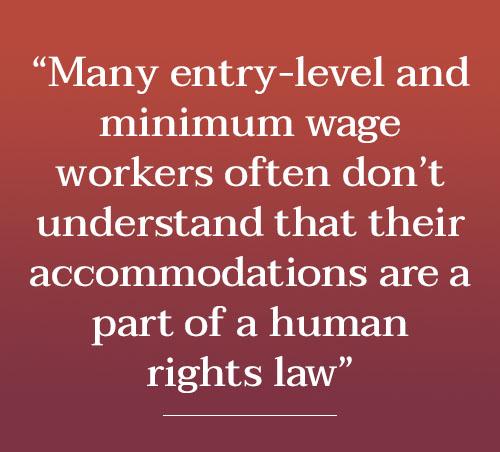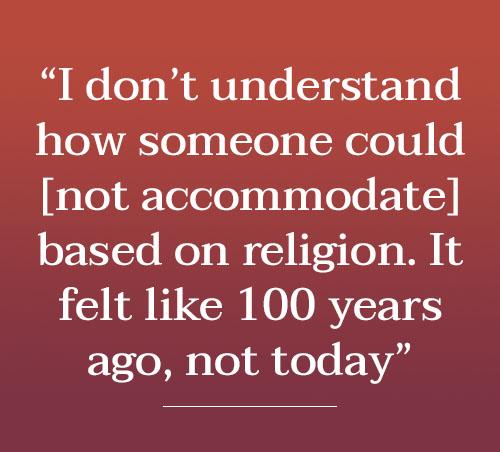Minority religions are on the rise in Canada but Rye students still face undue hardship at work.
Words by Mariam Nouser
Visuals by Jes Mason
My first steady job after high school was working at Starbucks as a barista. I was hired at the Yonge and Dundas location in November 2015 and typically worked closing shifts due to my school schedule. Back then, I was a full-time engineering student and needed an income to support my mom. She had recently been denied leave pay for taking time off to take care of her dying brother.
I needed to get off the floor to pray no more than twice a day, but, when it came to the religious accommodation, I felt scared to ask due to my already inflexible work availability
As the only visible Muslim working at the location, I often felt mistreated by the manager. The typical question, “Where are you from?” came out of her mouth on one of my first shifts. I’d be hyper-aware of the cloth on my head and constantly ensure that my English was perfect, despite it being my first language. Even before I started working there, she was reluctant to hire me, even when the assistant manager vouched for me.
Whenever it came to performance reviews, I’d have lower than expected ratings even though the manager had never worked with me before. At my first review, she told me how the supervisors supposedly thought I was incapable of being useful on the floor. I was a hard and diligent worker who always made sure things were done perfectly, so that came as a shock to me. Dishes were done fast and quick. I was kind and welcoming on cash but also quick to process orders. However, nothing ever seemed like it was enough.
A couple of weeks after that one-on-one, she pulled me aside and said, “Mariam, I would like you to meet with Pouya. He is going to be the manager at the MaRS Starbucks and we were thinking it’d be wise if you transferred there…You will have a better chance to grow there than here.” I felt horrible going to work at Yonge and Dundas for the remainder of my two months there.

With the tension at work after my forced, pending transfer, I often felt, even more like I couldn’t ask to leave the floor for a few minutes to pray my obligatory prayers. I thought to myself, “I’m obviously a nuisance to her, so why should I make her life even more hellish?”
Fast forward two and a half years, and I was working at a 24-hour Starbucks in Mississauga, Ont. where we were assigned a new manager after the previous one quit. He had a Muslim last name, so I thought he would understand that I needed Eid off and time to pray during my shift. Unfortunately, I was wrong.
The amount of people identifying with minority faith groups has been on the rise for the last two decades. According to Statistics Canada, in 2011, just over seven per cent of people identified as Muslim, Hindu, Sikh or Buddhist, which is up from 2001 by nearly five per cent.
While many national statutory holidays have always coincided with Christian holidays, people who practice minority faiths are finally asking for the same rights—vacation during religious holidays and accommodation for traditional practices.
In 2015, New York City mayor Bill de Blasio announced that Eid Al-Adha and Eid al-Fitr would be added to the list of holidays for public schools—making the Muslim holiday a day off for students. This came after the city added Jewish holidays to their calendar which was cited as a way to celebrate diversity.
However, it hasn’t been as easy for Ryerson students. Some say ignorance, a lack of understanding from management and unequal power dynamics can result in them feeling uncomfortable to ask for religious accommodation in the workplace.
Dean Delpeache, a diversity, inclusion, belonging and equity professor at George Brown College, says workplaces need to invest in training their managers to be inclusive.
By providing leadership training and investing in understanding differences, employers can alleviate the pressure workers of minority-faiths feel when seeking accommodation. They can also get the best results out of a team, according to Delpeache.
“When employees know that their employer really is seeking to do what they can do to provide a psychologically safe space, that employee will thrive,” says Delpeache.
Delpeache said that while students can advocate for themselves through legal avenues, the onus should be on the leaders and management to foster an inclusive environment.

ourth-year arts and contemporary studies student Abbey Humphreys-Morris worked in a small retail store during her first two years at Ryerson. As a practicing Jewish person, Humphreys-Morris observes Shabbat, or the Jewish day of rest that commences after sundown, on Friday.
Like many retail stores, she says her place of work was often busy on Friday evenings and required appropriate staffing. However, when getting hired, she requested to have Friday evenings off to observe Shabbat and, in return, gave a wide range of availability.
Despite the ample notice, her manager often requested that she work on Friday evenings, saying on numerous occasions that no one else could take the shift. However, when she’d ask her co-workers to cover the shift, she almost always found someone right away.
Further, when it came to her co-workers seeking time off for school functions or birthdays, her manager was understanding but still insistent that Humphreys-Morris work Friday nights.
She had to be strategic in her scheduling, saying that she couldn’t work past 4 p.m., even though that was well before sundown, in case her manager decided to schedule her past her written availability.
“I don’t understand how someone could [not accommodate] based on religion. It felt like 100 years ago, not today,” Humphreys-Morris said.
With major Jewish holidays such as Yom Kippur and Rosh Hashanah, Humphreys-Morris always had to book time off at least two months in advance in addition to stressing how important it was to have her holidays off.
In the 2011 census, just under 330,000 people identified as Jewish in Canada.
Humphreys-Morris subsequently felt less inclined to go the extra mile at the workplace, something she liked to do at previous jobs. She started doing the bare minimum of her job expectations.
“I didn’t feel like I should work above and beyond because they didn’t want to respect my time,” she said.
Delpeache says when a manager is not willing to offer accommodations for things that are not considered “undue hardship,” it can make an environment very pressuring.
“What ends up happening is…people start to overcompensate and workers stop being themselves,” says Delpeache. “Employees’ value starts eroding and they start isolating themselves.”
“[After a while], the workplace becomes toxic.”
Humphreys-Morris asked herself why her religious needs weren’t as important as others. Due to the constant revisiting of seeking Friday nights off, she said her relationship with her manager became strained and she ended up quitting her job.
Humphreys-Morris now works at a Starbucks in Aurora, Ont. and was referred to the job by a Jewish shift supervisor at the store. The manager knew about Shabbat through the referring supervisor, so, when she was hired, they immediately asked if she needed Friday evenings off—what Humphreys-Morris calls the complete opposite of her other job experience.
“It’s sad to me that it takes [a superior] at work to advocate for a worker to get their religious needs accommodated for,” she said.
Humphreys-Morris says it was much easier for her to have her Friday evenings and holidays off because of someone else having a similar level of religious practice in her workplace.
For Humphreys-Morris, it took a leader with an inclusive mindset and cultural understanding to have a voice in the workplace. But Delpeache says that students can also advocate for proper workplace treatment themselves if they know the law.
“Many entry-level and minimum wage workers often don’t understand that their accommodations are a part of a human rights law,” he says.
According to the Ontario Human Rights Commission, employers have a legal duty to accommodate people’s beliefs and practices to promote equal opportunity and access. They need to ensure that “people do not have to choose between observing their religion or creed, and being gainfully employed.”
They recognize that “the ‘normal ways of doing things’ in organizations and society are often not ‘neutral,’” but instead better meet the needs of some groups over others.

ivya Bumrah worked at a pizza parlour close to her house in Mississauga, Ont. the summer after her second year of university. The now fourth-year biomedical science student worked throughout her summers to save up enough money for the school year.
One day, when Bumrah was tasked with making pizza, an order came in for a choose-your-toppings pizza, with cheese, peppers and ground beef. As a person practicing the Hindu faith, Bumrah doesn’t eat beef in accordance with the beliefs that cows are sacred.
She told her manager that she couldn’t make the pizza as she wasn’t comfortable handling beef. She asked without hesitancy since she thought it would be easy for her manager to assign pizzas with beef to another worker.
Instead, her manager told her to just wear gloves and continue making the pizza. The suggestion that someone else make that particular pizza rewarded her with a “weird look” and a reminder to “go to work.”
Bumrah said she experienced other forms of mistreatment in her workplace that she feels were directly related to her being a racialized person and someone of the Hindu faith. She says her manager favoured her white, male colleague. She asked that same colleague if they noticed the disparity in treatment, and after considering it for a second, he agreed.

Co-workers can be both a validating and important line of defence against discrimination from management. Their inaction, however, can also contribute to the toxic environment.
In a 2020 study called Confronting Racism with Solidarity, 42.3 per cent of respondents said their coworkers didn’t do anything to challenge the prejudice and racism they experienced in the workplace.
The study says, “white [workers and management] can contribute to fostering organizational cultures of openness, active listening, non-defensiveness, and relationship building, and can play an important role in speaking out against racism at work and more broadly.”
Once, Bumrah sprained her ankle prior to work and asked her manager if she could sit for a second when there wasn’t a rush. Her manager said that one of her white colleagues happened to sprain her ankle too but didn’t need to rest.
When she went to go check on her other co-worker who had also supposedly gotten hurt, she told her she didn’t in fact sustain that injury.
Soon after, Bumrah left that job due to the treatment she experienced.
Two weeks later, she found another job at the Canadian National Exhibition (CNE). While still working in food, Bumrah said this experience was completely different because her manager was a person of a minority faith and “understood what accommodations other people of minority faith had.”
“My manager always made sure that many diets were accommodated at my job: Kosher, Halal, Vegetarian,” says Bumrah.
According to a 2019 article by the International Journal of Business Communication, supervisors can directly influence their workers’ job satisfaction and indirectly influence their motivation and burnout. According to their study, when supervisors increase solidarity with their workers, the worker’s job satisfaction also increases.
Bumrah says when Eid rolled around during the CNE’s run, her boss was always willing to give her Muslim employees the time off they needed to enjoy the twice-a-year holiday. She said her boss even gave people flexibility if they wanted to spend more time with their families during holidays.
As a result, she says she started feeling like a human being—not just an employee number or worker—alive and respected.
Bumrah believes it was helpful to have a manager of a minority faith because it puts less pressure on the employee who may seek accommodation. However, she feels that people need to be understanding of others’ cultural and religious traditions even if they don’t identify with them. As Bumrah says, it’s a basic human right that all people should be granted.
When it comes to dealing with microaggressions at work, if the problem persists, Delpeache recommends bringing it up to a senior leader or to a human resources department. “If the problem still persists, it is harassment and the human rights commission should be notified.”

hen my new manager started at the Mississauga location in 2018, I’d just been promoted to shift supervisor, mostly working the overnight shift on weekends and, occasionally, a day shift in the week.
When it was just myself and a barista working in the early hours, I felt comfortable being honest with them and telling them I was going to pray. I was the one in charge and when I explained myself, she was understanding. I tried to act as I wanted others to act towards their employees: compassionately and kindly.
When I switched days due to my doctor-mandated orders, I came across passive-aggressiveness from my manager. He would rely on me to cover shifts for others since I happened to live close by, but whenever I needed accommodation, that help wasn’t returned.
The holidays were coming up and people quickly took time off during Christmas and New Year’s Eve, leaving me to work the shifts, willingly. I could sacrifice some sanity during those hectic days at work to make sure people who celebrated Christmas could enjoy it stress-free with their families.
One day shortly after the holidays, I put my brave face on and pulled my manager aside to tell him how important praying was to me and how I would sincerely appreciate it if I were allowed to come off the floor for five minutes to fulfill my religious obligations.
My manager, who was a Muslim but didn’t pray, frowned. “I’ll try,” he said, which typically meant no with him. I thought, of all people, he would understand how important prayer is but I guess because he was not praying, neither could I.
Because of the stress and toxicity at work as well as the death of one of my co-workers, I began feeling extremely sick and was later hospitalized for almost three weeks. I decided then and there that nothing was worth my health and quit, leaving myself in financial limbo but making my heart lighter.
Delpeache says when it comes to workers being treated unfairly by managers of the same faith, it comes down to a lack of formal training.
“Say there’s a Muslim manager who went up the ranks, worked hard, put in his dues and he expects the same from his colleagues yet he hasn’t received adequate training on how to lead,” says Delpeache. He notes that issues workers face don’t necessarily have to only come from people of different belief systems but people of the same faith as well.
My hope is that one day those who practice minority faiths don’t have to exhaust themselves by justifying their need to have their religious accommodations met. It is simply a human right, not a privilege to celebrate the holidays and traditions that are part of your religion.
A previous version of this article incorrectly stated that Humphreys-Morris practices Ashkenazi Judaism, which is not actually a branch of the religion. The Eye regrets this error.













Maya
“As someone who practices Ashkenazi Judaism”
Ashkenazi Judaism isn’t a religious branch of Judaism. It’s not really something that someone can “practice.” It’s just a word to describe Jews from Europe.
I really appreciate the time and effort that went into this piece, and the fact that the Eyeopener is writing about this important topic. But this line was a bit cringey to read.
Alex
I was wondering the same thing… what does it mean to “practice” Ashkenazi Judaism? You simply are an Ashkenazi Jew. Even saying “as someone who practices Judaism” wouldn’t make sense… Maybe “as a practicing Jew” would work? That’s about the most vague but still accurate phrase to use.
Thank you for the article! Very important topic.
Mariam Nouser
Hi Maya!
Thanks for the clarification. I will have the editor make this edit. So sorry for the misinformation, it was definitely an oversight!
Ruisi Liu
Great article sister Mariam <3